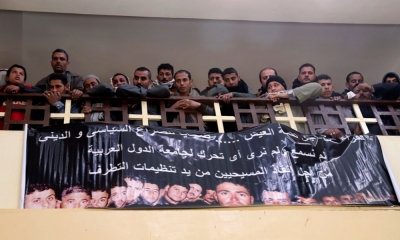In Egypt, Copts Are Being Persecuted Again

One week after the Copts of al-Our village in southern Egypt were attacked by an angry mob seeking to stop a church from being built, Copts in el-Galaa village endured the same treatment.
El-Galaa is home to 1,400 Copts who had been served for 38 years by the small 60-square-meter Virgin Mary Church. With their numbers in el-Galaa and surrounding villages growing, and their old church building decaying, the local Copts submitted a request in the early 2000s for building a new church and received a permit in 2004. Religious fanatics in the village prevented its construction by building a mosque next to the new church's designated location: Egyptian law prohibits houses of worship from being built next to each other. Building a mosque next to the location of a proposed church has been a common method used to prevent churches from being built.
Seeking to avoid a confrontation, Copts bought two houses next to the old church and in January 2015 received from the local governor the necessary permit to demolish the preexisting church and build a new one. Still, Copts have been prevented from building the church by a mob and security forces. In early March the mob physically attacked. In what has become a common practice, it also issued a number of demands: The church was to have no outer symbol of Christianity — no dome, no cross, no tower, no bell — and its entrance was to be on a side street.
Instead of confronting the mob and upholding the laws, the security forces attempted to negotiate with it but failed to convince them to desist from their effort to prevent the church's construction. Then the security forces forced Copts into a reconciliation session and forced them to accept the mob's demands. Encouraged by the conduct of the police, the mob added a new demand this week: The Copts must publish an apology in newspapers to the local Muslims. Their apparent crime was that they complained to the media and thereby tarnished the village's image.
As no punishment was meted out to the mob for its conduct, it is no surprise that attacks were repeated over the weekend. They began when some local Muslims threw rocks at a bus carrying Christian girls. The violence quickly spread. Rocks were thrown at Christian homes, and some shops owned by Christians were looted. Seven Copts were wounded in the attack. In typical fashion, the security forces have arrested 28 men from the village, including twelve Copts. It is common for Egyptian police to arrest both the attackers and the victims in order to force a new reconciliation session.
While the Egyptian regime hopes that its actions would bring order back to the village, its resort to reconciliation sessions instead of punishing the attackers has encouraged the local mob and led it to expect that it could carry on with impunity.
The conclusion that the fanatics have arrived at is that, if they attack Copts, not only will they not be punished but their demands will be met. If Sisi is serious with his talk of protecting the Egyptian state from falling into the same chaos that has overtaken much of the region, he needs to start by implementing the rule of law and protecting Copts.
This column was originally published in National Review.





















